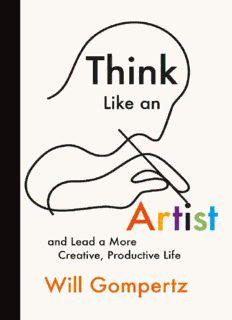
Think like an artist : and lead a more creative, productive life PDF
Preview Think like an artist : and lead a more creative, productive life
In Order of Appearance … Ninette de Valois Frederick Ashton Andy Warhol Vincent van Gogh Theaster Gates Bridget Riley Roy Lichtenstein David Ogilvy Marina Abramović Gilbert & George Caravaggio Picasso J. J. Abrams Piero della Francesca Luc Tuymans Johannes Vermeer Peter Doig Rembrandt Kerry James Marshall Michelangelo Ai Weiwei David Hockney Marcel Duchamp Bob and Roberta Smith By the same author What Are You Looking At? Editor: Michael Sand Designer: Darilyn Lowe Carnes Production Manager: Anet Sirna-Bruder Library of Congress Control Number: 2015957311 ISBN: 978-1-4197-2183-0 eISBN: 978-1-61312956-2 Copyright © 2015 Will Gompertz First published in the United Kingdom by Penguin Books Ltd. Published in 2016 by Abrams Image, an imprint of ABRAMS. All rights reserved. No portion of this book may be reproduced, stored in a retrieval system, or transmitted in any form or by any means, mechanical, electronic, photocopying, recording, or otherwise, without written permission from the publisher. Abrams Image books are available at special discounts when purchased in quantity for premiums and promotions as well as fundraising or educational use. Special editions can also be created to specification. For details, contact [email protected] or the address below. 115 West 18th Street New York, NY 10011 www.abramsbooks.com In memoriam Steve Hare Contents Preface Introduction 1. Artists Are Enterprising Andy Warhol, Vincent van Gogh, Theaster Gates 2. Artists Don’t Fail Bridget Riley, Roy Lichtenstein, David Ogilvy 3. Artists Are Seriously Curious Marina Abramović, Gilbert & George, Caravaggio 4. Artists Steal Picasso 5. Artists Are Skeptics J. J. Abrams, Piero della Francesca 6. Artists Think Big Picture and Fine Detail Luc Tuymans, Johannes Vermeer 7. Artists Have a Point of View Peter Doig, Rembrandt, Kerry James Marshall 8. Artists Are Brave Michelangelo, Ai Weiwei 9. Artists Pause for Thought David Hockney, Marcel Duchamp 10. All Schools Should Be Art Schools Bob and Roberta Smith 11. A Final Thought Acknowledgments Illustration and Photographic Credits PREFACE We cannot all paint like Picasso or sculpt like Michelangelo, but we can all think like an artist. When Marcel Duchamp asked, “Why does art have to be beautiful?” in 1917, he changed art forever. You or I could have done that. And we could have sparked an entire art movement like Damien Hirst did in 1991 by convincing an art dealer to pay to put a dead shark in a tank of formaldehyde. Even the mighty Cézanne is within our reach. He realized in the late nineteenth century that a subject shown from two different viewpoints in the same painting appeared more urgent and honest. Why? Because that’s how we see: with two eyes, not one. It was the insight that led to modernism in all its forms. We could have figured that out. So, why don’t we come up with great ideas if they’re so easy? Well, we can. And my hope is that this book will help show you how. INTRODUCTION Creativity is a hot topic. It is a subject that’s exciting politicians, academics and wise men and women the world over. They say it is very important. That it will be central to our future prosperity. Which is all well and good. But what exactly is creativity and how does it work? And why do some people appear to find it easy to come up with brilliant, fresh ideas while others don’t? Is it simply a case of “creative types” being programmed differently, or does it have more to do with behavior and attitude?
Description: